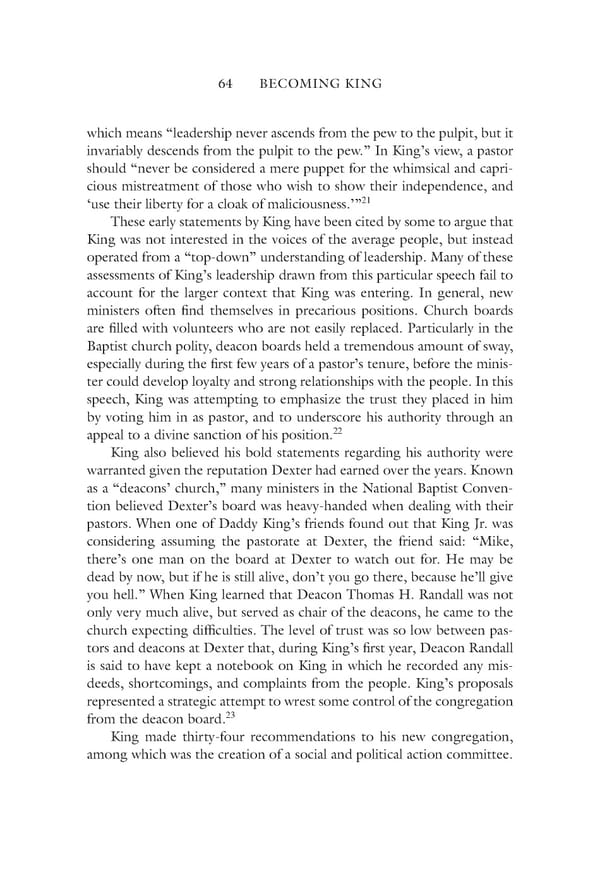64 BECOMING KING which means “leadership never ascends from the pew to the pulpit, but it invariably descends from the pulpit to the pew.” In King’s view, a pastor should “never be considered a mere puppet for the whimsical and capri- cious mistreatment of those who wish to show their independence, and 21 ‘use their liberty for a cloak of maliciousness.’” These early statements by King have been cited by some to argue that King was not interested in the voices of the average people, but instead operated from a “top-down” understanding of leadership. Many of these assessments of King’s leadership drawn from this particular speech fail to account for the larger context that King was entering. In general, new ministers often find themselves in precarious positions. Church boards are filled with volunteers who are not easily replaced. Particularly in the Baptist church polity, deacon boards held a tremendous amount of sway, especially during the first few years of a pastor’s tenure, before the minis- ter could develop loyalty and strong relationships with the people. In this speech, King was attempting to emphasize the trust they placed in him by voting him in as pastor, and to underscore his authority through an 22 appeal to a divine sanction of his position. King also believed his bold statements regarding his authority were warranted given the reputation Dexter had earned over the years. Known as a “deacons’ church,” many ministers in the National Baptist Conven- tion believed Dexter’s board was heavy-handed when dealing with their pastors. When one of Daddy King’s friends found out that King Jr. was considering assuming the pastorate at Dexter, the friend said: “Mike, there’s one man on the board at Dexter to watch out for. He may be dead by now, but if he is still alive, don’t you go there, because he’ll give you hell.” When King learned that Deacon Thomas H. Randall was not only very much alive, but served as chair of the deacons, he came to the church expecting difficulties. The level of trust was so low between pas- tors and deacons at Dexter that, during King’s first year, Deacon Randall is said to have kept a notebook on King in which he recorded any mis- deeds, shortcomings, and complaints from the people. King’s proposals represented a strategic attempt to wrest some control of the congregation 23 from the deacon board. King made thirty-four recommendations to his new congregation, among which was the creation of a social and political action committee.
 Becoming King: Martin Luther King Jr. Page 84 Page 86
Becoming King: Martin Luther King Jr. Page 84 Page 86